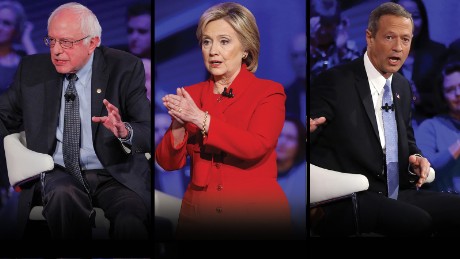By Richard E. Vatz
For MarylandReporter.com
The final meeting before the Iowa Caucuses of the Democratic candidates — a CNN town hall series of interviews and audience question-and-answers at Drake University — Sen. Bernie Sanders, former Gov. Martin O’ Malley former Secretary of State Hillary Clinton, was energized by three things: the closeness of the Iowa race, Sanders’ surging ahead in New Hampshire, and President Obama’s not-so-deft near endorsement of Hillary Clinton.
In an Oval Office interview with Politico just a couple of days ago, Obama gave perhaps the first indication that he prefers Hillary to Bernie: “Bernie came in with the luxury of being a complete long shot and just letting loose…I think Hillary came in with the both privilege — and burden — of being perceived as the front-runner. … You’re always looking at the bright, shiny object that people haven’t seen before — that’s a disadvantage to her.”
Hillary is apparently being rewarded for her loyalty to the president, including her repeated observation, according to Politico, that he hasn’t received “the credit he deserves.”
Questions were submitted by the audience and “screened” before they were read.
Sanders
CNN’s Chris Cuomo asked in his initial interview with Senator Sanders if he was surprised by the excitement his campaign has engendered. That was the first softball question. Then he was asked if he is “up to the job.” Not so surprising, he said yes.
Asked about his concept of Democratic Socialism, Sanders said there is something wrong when the rich get richer and the poor get poorer. A government should not just work for people at the top, he said again.
Cuomo asked if Sanders wanted to bring back the era of big government. Sanders went to his usual solution of taxing Wall Street and the well-to-do but was never asked as to whether raising taxes would adequately fund policies such as free tuition in public colleges and universities. Sanders’ unchallenged claim of the single cause of pay inequality? “Old fashioned sexism.”
Like all candidates from both parties, Sanders finds a major solution to America’s social problems to be ferreting out the “mentally ill” for, presumptively, voluntary therapy and/or involuntary incarceration. No one is ever challenged by journalists on this solution.
O’Malley
Martin O’Malley jumped on stage, buoyant, and started out by saying Iowans can upset the apple cart. He was asked about his early Maryland zero-tolerance policy which was seen by many as discriminatory against law-abiding African-Americans. He turned the conversation to how allegedly the state was saved from terrible problems by his approach. He reiterated his belief in “Black Lives Matter,” while ignoring without challenge his original but politically incorrect formulation that “All Lives Matter.”
Clinton
Clinton appeared and said she had long fought for equality. She said she believed that force was a last resort in foreign policy. She said she made a mistake in supporting the war against Iraq, but received no substantive follow-up questions about that position.
She smartly reversed her anti-Republican rhetoric to emphasizing seeking common ground with them when governing, countering her reputation as seeing Republican conspiracies at the root of her and her husband’s political struggles.
No tough questions
There weren’t any really tough questions for Sanders about where he would get the money for all of his government programs beyond taxing Wall Street more; there were no questions to O’Malley about why his party lost the election for governor in a 3-1 Democratic State following his two terms or what that implies about the success of his governorship; and there was a question and follow-up for Hillary on her Benghazi behavior which arguably led to our diplomats’ deaths, but of which she dismissed the particulars by saying we have historically been attacked by terrorists and then we adjust policy.
Well-prepared
O’Malley’s ethos was far more exciting than his opponents’, but all three were well prepared in the meeting. The lack of serious and challenging questions was disappointing but not surprising. It is hard to imagine that this series of interviews will change the outcome in Iowa. There were no significant surprises, and that’s why this town hall meeting will likely leave Clinton and Sanders neck and neck.
Professor Vatz teaches political rhetoric at Towson University
Good format, but harmed by lack of follow-up; authenticity deficit
By Len Lazarick
I agree with Professor Vatz’s concluding paragraph. But I must say I prefer this format to the debate style, which is especially unsatisfying with more than two candidates. I also liked the earlier one they did in South Carolina with Rachel Maddow.
But there was a serious lack of follow-up by moderator Chris Cuomo, who let the candidates ramble on too long. The use of questioners from the audience also means that most are nervous if not terrified, and they do not ask for follow-up questions to get better answers.
I learned the most about Bernie Sanders, and he also came across as the most authentic of the three. O’Malley still has not been able to cure himself of the staginess that seems to afflict him on any stage. Marylanders also know him and his record too well to accept his answers about his crime policies and the notion that he knows how to “bring people together.” O’Malley as mayor and governor never had to deal with Republicans as true governing partners, as they are in Washington. In Annapolis, he just had to bring together cantankerous Democratic leaders used to getting their own way.
Talk about knowing someone too well, that’s Hillary — in the national limelight for 25 years, flexible on policy, passionate about some issues, and truth-challenged on others.
It is such a blessing that in the next two weeks, real voters who have gotten to see a lot of all these candidates will make their choices, and provide a reality check to all the pundit blather.








Recent Comments